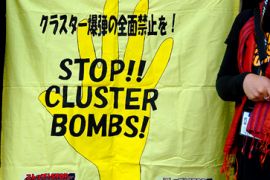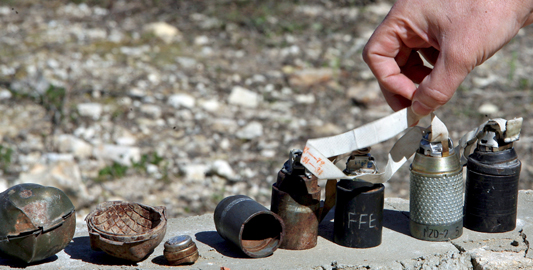UK to destroy cluster bomb stocks
Meeting in Dublin brings together support for ban from more than 100 nations.

 |
| More than 100 countries are behind proposals to ban cluster bombs [File: EPA] |
Gordon Brown, the British prime minister, has said that Britain will remove all cluster bombs from its military arsenal, as nations continued to attempt to make an agreement on an international ban of the weapon.
“We have decided we will take all our types of cluster bombs out of service,” Brown said in London on Wednesday.
More than 100 nations are finalising a ban for the use, production, stockpiling and transfer of all cluster bombs, in Dublin, the capital of Ireland, after 10 days of negotiations.
No US involvement
The United States has not sent an envoy to the conference, but the UK’s involvement may increase pressure on the US to become involved.
The US says that the proposed convention would hinder humanitarian activities because its military has such weapons on its inventories.
Stephen Mull, an assistant secretary of state, said: “Any country that signs the convention in effect would make it impossible for the United States or any of our other allies who rely on these weapons to participate in these humanitarian exercises.”
Israel, Pakistan, China and Russia, along with the US, are among the main producers and stockpilers of the weapon. They all oppose any ban.
Britain did not initially express support for the ban, but appears to have changed tack.
Any agreement would be formally signed in December in Norway. The Dublin negotiations end on Friday.
Stumbling block
A central sticking point of the negotiations is how the armed forces of those nations signing any treaty will work alongside nations who have not signed up.
Some of those involved in negotiations want to outlaw signatories working with non-signatories in military deployment.
Talks began in Norway in February 2007 to end the use of the bomb.
In what is known as the Oslo Declaration of February 2007, 46 governments agreed to create a legally binding instrument prohibiting the use of cluster munitions and providing adequate resources to assist survivors and clear contaminated areas during 2008.
When fired, cluster munitions release small “bomblets” in mid-air, which spread over a large area.
Many of the bombs do not detonate and remain dangerous, injuring and killing civilians outside of war time.
There is currently no international law making the use of cluster bombs illegal.